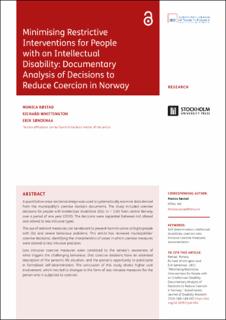Minimising Restrictive Interventions for People with an Intellectual Disability: Documentary Analysis of Decisions to Reduce Coercion in Norway
Peer reviewed, Journal article
Published version

Åpne
Permanent lenke
https://hdl.handle.net/11250/3111236Utgivelsesdato
2023Metadata
Vis full innførselSamlinger
- Institutt for psykisk helse [1312]
- Publikasjoner fra CRIStin - NTNU [38677]
Originalversjon
Scandinavian Journal of Disability Research. 2023, 25 (1), 160-169. 10.16993/sjdr.984Sammendrag
A quantitative cross-sectional design was used to systematically examine data derived from the municipality’s coercive decision documents. The study included coercive decisions for people with intellectual disabilities (IDs) (n = 120) from central Norway over a period of one year (2020). The decisions were separated between not altered and altered to less intrusive types.
The use of restraint measures can be relevant to prevent harm in some caring to people with IDs and severe behaviour problems. This article has reviewed municipalities’ coercive decisions, identifying the characteristics of cases in which coercive measures were altered to less intrusive practices.
Less intrusive coercive measures were correlated to the service’s awareness of what triggers the challenging behaviour, that coercive decisions have an extended description of the person’s life situation, and the person’s opportunity to participate in formalised self-determination. The conclusion of this study shows higher user involvement, which has led to changes in the form of less intrusive measures for the person who is subjected to coercion.
